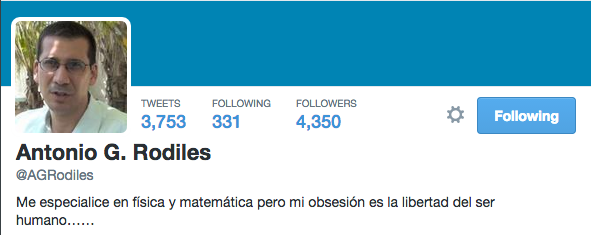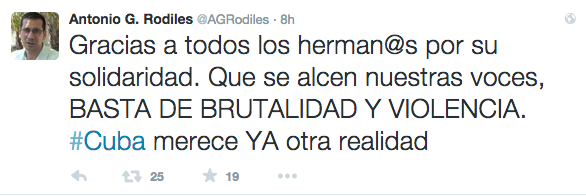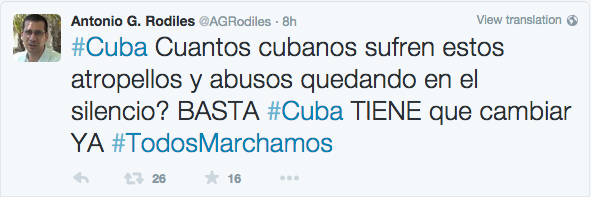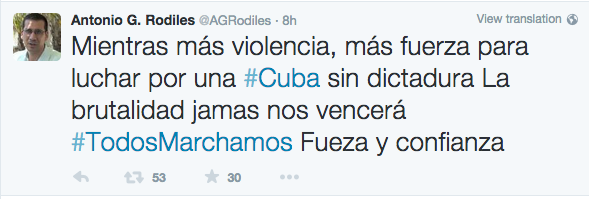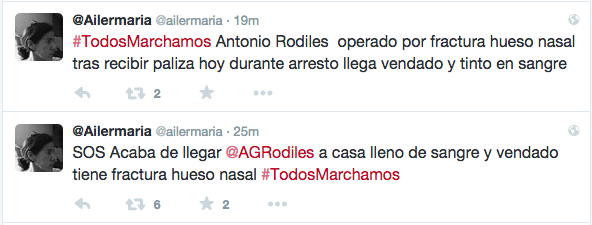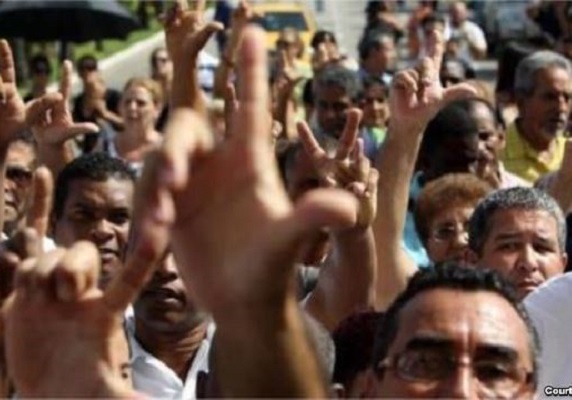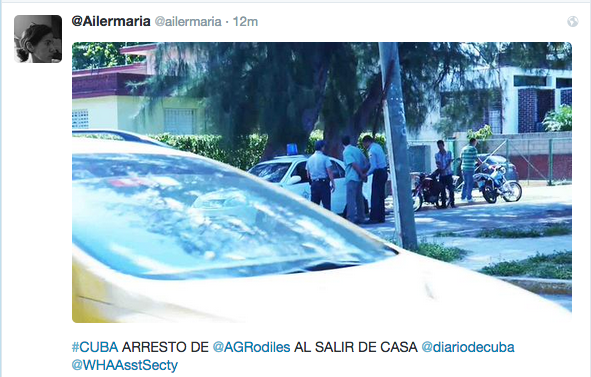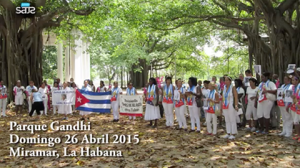Martin Luther King Jr.: This “wait” has almost always meant “never.”*
Antonio Rodiles, 1 February 2016 — More than a year after the announcement of the restoration of relations between the United States government and the Havana regime, the direction that the political and economic landscape of our island will take remains uncertain.
The administration of President Barack Obama has outlined and is delivering a broad agenda full of concessions to the regime without asking for or receiving anything in return, either for the United States or for the Cuban people.
It is important to note that the violation of the freedoms and political, civil, economic, social and cultural rights of Cubans is provided for in the existing judicial and legal system, which limits, by law, the implementation of any measure that could work to our favor.
The United States government has validated the Castro regime as a political actor, and expects that internal and external sectors, including the opposition, accept this premise and develop strategies based on it. continue reading
The agenda shows a certain logic and points in common with that established with Burma, although the Cuban regime hasn’t shown a willingness to take even the first steps. It is important to point out that the intentions and scope, particularly in the international arena, of the two dictatorships have been very distinct, as have the environments in which they have developed.
One of the elements that makes the Cuban case unique is the existence of an exile only 90 miles away, with significant human, political and financial capital, which the regime looks on with profound fear. It is no wonder that they have focused in recent years not only on trying to feed off of this exile, but also on seeking agents and spaces of influence to try to control it or at least to link themselves to it. There is no political or social dynamic in the island’s present or future that could effectively ignore the role of the exile.
In line with the Burmese case, some propose elections in Cuba as one possible path to democracy, even within the ironclad totalitarian environment. Endorsing an electoral process within this scenario would end up legitimating the regime and its successors, at least in the medium term, and would also leave in their hands all the economic power and networks of influence for a new political moment. Accrediting neo-Castroism is the path diametrically opposed to the creation of the Rule of Law.
The possible visit of President Obama to our island seems to be presented in terms similar to his first trip to Burma. In that case, the president met with the opposition leader Aung San Suu Kyi, who on many occasions has been criticized for showing hesitancy in the face of human rights violations. He also met briefly with other representatives of civil society. The visit took place under strong criticism from opponents such as the former political prisoner Aung Din, who called it an act of legitimation of the ruling regime.
There is strong concern that a trip to Cuba by the United States president will be another boost to neo-Castroism. While the president has publically stated that he wants to meet with different sectors of Cuban society, we get the impression that the opposition, above all those who don’t share the current administration’s agenda, could be discounted as has happened in other cases.
Including the self-employed, intellectuals and other actors who remain under the full control of the regime within the definition of civil society tries, and in many cases succeeds, in diluting and diminishing clear and direct discourse about the daily excesses and abuses on the island.
We have heard with great insistence the fallacious argument that the opposition is far removed from the people and their problems. This assertion shows a lack of information and an ignorance of the nature and behavior of totalitarian regimes.
The opposition is a portion of the people, already fed up, who dare to openly and directly point to the regime as the main axis of our problems, and demand our basic rights despite the high cost this implies. To demand the exercise of our rights constitutes the maximum commitment of any opposition movement against a despotic and corrupt dictatorship like that embedded in our country for almost 60 years now.
To admit the legitimacy of the Castro regime implies consent to its crimes and violations, past and present. To accept that neo-Castroism is a part of the future of our nation deeply burdens and condemns us in advance. Those who propose a supposed reconciliation, in which truth, justice and compensation for victims are not contemplated as fundamental elements, are mistaken.
The White House has in its hands to change the direction to a process that doesn’t enjoy the respect and support of broad groups of Cubans, above all those who have paid a high cost for openly confronting such a despotic regime. To insist on an agenda where principles and truth are absent, is to condemn it to failure.
President Obama’s visit, despite the softening of the initial euphoria and expectations, it could bring more legitimacy to the regime and more confusion and bewilderment to Cubans. As on other occasions, all the momentum will end up fading if it is not conditioned on the dictatorship taking concrete steps to dismantle totalitarianism.
The unfavorable impressions of many Cubans left by the visits of Pope Francis and Secretary of State John Kerry are very fresh in our memories. In both cases it was the regime that reaped the greatest dividends, comfortably settled in its intransigence and violence.
Three basic steps that could give a context to the visit, as proposed by the Forum for Rights and Freedoms (ForoDyL) are:
– Immediately cease the repression against every Cuban who defends their fundamental rights and freedoms. Amnesty for political prisoners or prisoners confined for acts with political connotations.
– Ratification and monitoring of the implementation of the United Nations Covenants on Human Rights.
– Formal meeting with a representation of the Cuban opposition.
We who demand and defend our rights and freedoms and who, for more than nine months, have gone out into public spaces to exercise them under the campaign #TodosMarchamos (We All March), know well the repressive face of the regime. Despite the costs involved we continue in an effort that we consider vital in this struggle.
In similar circumstances and facing similar challenges and dilemmas, civil rights leader Martin Luther King Jr. declared:
“On some positions cowardice asks the question, is it safe? Expediency asks the question, is it politic? Vanity asks the question, is it popular? But conscience asks the question, is it right? And there comes a time when one must take a position that is neither safe, nor politic, nor popular but he must take it because conscience tells him it is right.”**
*Martin Luther King, Jr. Letter From Birmingham Jail, April 16, 1963
** Martin Luther King, Jr. A Proper Sense of Priorities. A speech delivered in Washington D.C. on February 6, 1968, on American involvement in the war in Vietnam.

